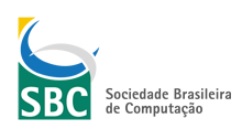Avaliando Agentes Reativos em Ambientes de Tarefas Parcialmente Observáveis e Normativos
Resumo
Humanos necessitam de leis que regulem as suas ações. Da mesma forma, quando aplicamos normas em sociedades de agentes, percebemos que tende a aumentar o desempenho do sistema segundo critérios que o projetista quiser. A proposta é avaliar o efeito que um tipo de norma de proibição de ações pode ter no desempenho de agentes reativos simples e agentes baseados em modelos com regras condição-ação, em ambientes de tarefas parcialmente observáveis. Estes agentes têm como princípio inibir aquelas regras, em seus conjuntos de regras condição-ação, que contenham alguma ação proibida como consequente. Os agentes demonstraram capacidade de entender estas normas específicas e evitar a realização de ações proibidas.Referências
Ahmad A. (2012) “An agent-based framework incorporating rules, norms and emotions (OP-RND-E) [Ph.D. thesis]”, Universiti Tenaga Nasional,Selangor,Malaysia.
Alberti M., Gomes A. S., Goncalves R., Leite J., and Slota M. (2011), “Normative systems represented as hybrid knowledge bases,” in Computational Logic in MultiAgent Systems: Proceedings of the 12th International Conference on Computational Logic in Multi-Agent Systems (CLIMA '11), vol. 6814 of Lecture Notes in Computer Science,pp.330–346,Springer,Berlin,Germany.
Boella G., Vander Torre L. e Verhagen H. (2005),“Introduction to normative multiagent systems,” in Proceedings of the 1st International Symposium on Normative Multiagent Systems (NorMAS '05), pp.1–7, April.
Russel, S. , Norvig, P. (2004) “Artificial Intelligence: a modern approach.” Prentice-Hall, New Jersey.
Aragao P., Campos G., Cortés M., Cruz F. (2014) “Uma abordagem para o tratamento racional de normas de obrigação em ambientes de tarefas normativas” [Autosoft Review], Universidade Estadual do Ceará, Ceará
Freire E., Campos G., Cortés M., Vasconçelos W. (2013) “An approach for norm-based behavior modification in model-based reflex agents” .In: 15th International Conference on Artificial Intelligence (ICAI), Las Vegas, Nevada, USA, Proceedings of the 14th International Conference on Artificial Intelligence.
Campos G., Freire E., Cortés M. (2012) “Norm-based behavior modification in reflex agents”.In: 14th International Conference on Artificial Intelligence (ICAI), Las Vegas, Nevada, USA, Proceedings of the 14th International Conference on Artificial Intelligence.
Alberti M., Gomes A. S., Goncalves R., Leite J., and Slota M. (2011), “Normative systems represented as hybrid knowledge bases,” in Computational Logic in MultiAgent Systems: Proceedings of the 12th International Conference on Computational Logic in Multi-Agent Systems (CLIMA '11), vol. 6814 of Lecture Notes in Computer Science,pp.330–346,Springer,Berlin,Germany.
Boella G., Vander Torre L. e Verhagen H. (2005),“Introduction to normative multiagent systems,” in Proceedings of the 1st International Symposium on Normative Multiagent Systems (NorMAS '05), pp.1–7, April.
Russel, S. , Norvig, P. (2004) “Artificial Intelligence: a modern approach.” Prentice-Hall, New Jersey.
Aragao P., Campos G., Cortés M., Cruz F. (2014) “Uma abordagem para o tratamento racional de normas de obrigação em ambientes de tarefas normativas” [Autosoft Review], Universidade Estadual do Ceará, Ceará
Freire E., Campos G., Cortés M., Vasconçelos W. (2013) “An approach for norm-based behavior modification in model-based reflex agents” .In: 15th International Conference on Artificial Intelligence (ICAI), Las Vegas, Nevada, USA, Proceedings of the 14th International Conference on Artificial Intelligence.
Campos G., Freire E., Cortés M. (2012) “Norm-based behavior modification in reflex agents”.In: 14th International Conference on Artificial Intelligence (ICAI), Las Vegas, Nevada, USA, Proceedings of the 14th International Conference on Artificial Intelligence.
Publicado
04/05/2017
Como Citar
FIGUEIREDO, Levi Porto; CAMPOS, Gustavo Augusto Lima de; CORTÉS, Mariela Inês.
Avaliando Agentes Reativos em Ambientes de Tarefas Parcialmente Observáveis e Normativos. In: WORKSHOP-ESCOLA DE SISTEMAS DE AGENTES, SEUS AMBIENTES E APLICAÇÕES (WESAAC), 11. , 2017, São Paulo/SP.
Anais [...].
Porto Alegre: Sociedade Brasileira de Computação,
2017
.
p. 199-204.
ISSN 2326-5434.
DOI: https://doi.org/10.5753/wesaac.2017.33242.



